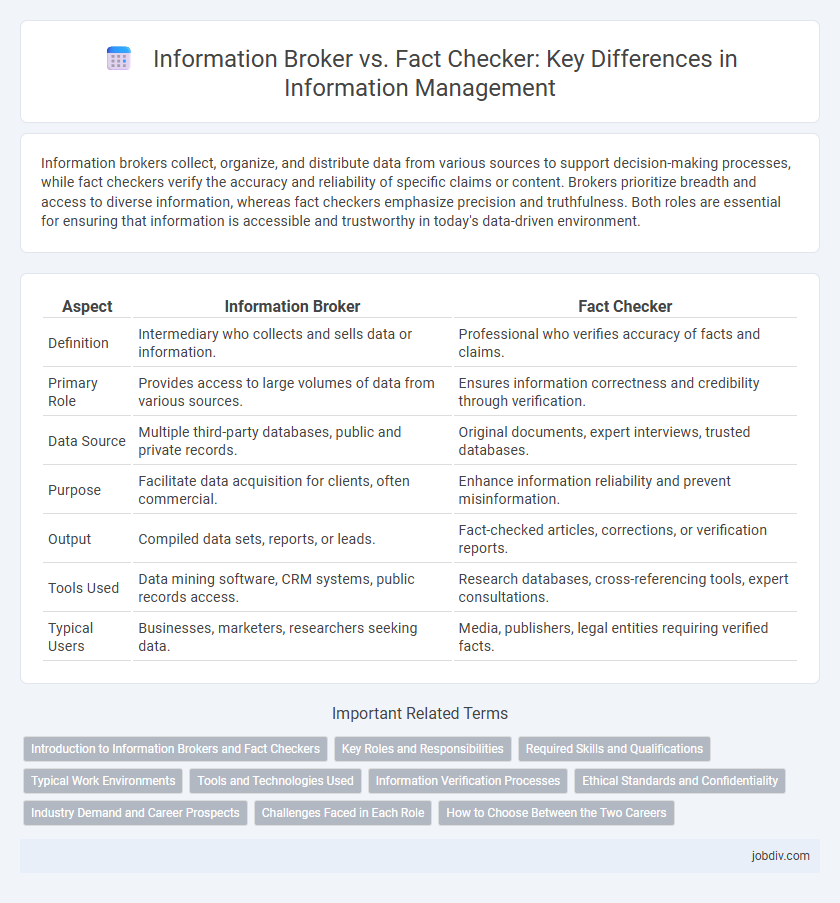Information brokers collect, organize, and distribute data from various sources to support decision-making processes, while fact checkers verify the accuracy and reliability of specific claims or content. Brokers prioritize breadth and access to diverse information, whereas fact checkers emphasize precision and truthfulness. Both roles are essential for ensuring that information is accessible and trustworthy in today's data-driven environment.
Table of Comparison
| Aspect | Information Broker | Fact Checker |
|---|---|---|
| Definition | Intermediary who collects and sells data or information. | Professional who verifies accuracy of facts and claims. |
| Primary Role | Provides access to large volumes of data from various sources. | Ensures information correctness and credibility through verification. |
| Data Source | Multiple third-party databases, public and private records. | Original documents, expert interviews, trusted databases. |
| Purpose | Facilitate data acquisition for clients, often commercial. | Enhance information reliability and prevent misinformation. |
| Output | Compiled data sets, reports, or leads. | Fact-checked articles, corrections, or verification reports. |
| Tools Used | Data mining software, CRM systems, public records access. | Research databases, cross-referencing tools, expert consultations. |
| Typical Users | Businesses, marketers, researchers seeking data. | Media, publishers, legal entities requiring verified facts. |
Introduction to Information Brokers and Fact Checkers
Information brokers specialize in gathering, analyzing, and distributing data to help businesses and individuals make informed decisions. Fact checkers verify the accuracy and reliability of information by cross-referencing sources and identifying misinformation to maintain content integrity. Both roles play crucial parts in the information ecosystem, ensuring data quality and trustworthiness.
Key Roles and Responsibilities
Information brokers specialize in gathering, organizing, and distributing data from various sources to meet client needs, often handling large volumes of raw information. Fact checkers critically evaluate the accuracy and credibility of claims by verifying facts against reliable sources, ensuring content integrity and preventing misinformation. Both roles are essential for maintaining information quality, with brokers providing data accessibility and fact checkers enforcing truthfulness.
Required Skills and Qualifications
Information brokers require strong research skills, proficiency in data analysis, and expertise in sourcing reliable information from diverse databases and networks. Fact checkers need keen attention to detail, critical thinking abilities, and familiarity with verification tools and credible sources to assess the accuracy of claims. Both roles demand excellent communication skills and a solid understanding of information ethics and legal considerations.
Typical Work Environments
Information brokers typically operate in dynamic environments such as corporate offices, research firms, or digital platforms where sourcing and selling specialized data is essential. Fact checkers primarily work within news organizations, media outlets, or independent verification agencies, emphasizing accuracy and credibility in content verification. Both professions require access to extensive databases and rapid online research tools to fulfill their roles effectively.
Tools and Technologies Used
Information brokers utilize advanced data aggregation tools, databases, and AI-powered analytics platforms to collect, filter, and compile diverse data sources for comprehensive reports. Fact checkers rely on verification technologies, including cross-referencing databases, automated claim verification software, and digital forensics tools to ensure the accuracy and reliability of information. Both roles leverage machine learning algorithms and natural language processing to enhance data processing efficiency and precision in their respective tasks.
Information Verification Processes
Information brokers gather, organize, and sell data from various sources, but they may not always verify the accuracy or reliability of the information. Fact checkers specialize in verifying the validity of claims by cross-referencing multiple credible sources, employing rigorous methodologies and primary data analysis. The information verification process in fact checking involves detailed scrutiny of evidence, source credibility assessment, and bias identification to ensure factual integrity.
Ethical Standards and Confidentiality
Information brokers often operate with less stringent ethical standards and may prioritize data acquisition over confidentiality, whereas fact checkers adhere to rigorous ethical guidelines ensuring accuracy and transparency while safeguarding sensitive information. Fact checkers employ verification methodologies to maintain trust and integrity, emphasizing the responsible handling of data to protect privacy. Ethical standards in fact checking promote accountability and prevent misinformation, contrasting with information brokers whose practices sometimes lack comprehensive oversight.
Industry Demand and Career Prospects
Information brokers specialize in gathering, analyzing, and selling data across various industries, experiencing growing demand due to the rise of big data and market intelligence needs. Fact checkers play a critical role in verifying the accuracy of information for media outlets, research organizations, and legal firms, with career prospects expanding as misinformation concerns intensify. Both roles require strong research skills, but information brokers often command higher salaries because of their expertise in data commercialization and strategic insights.
Challenges Faced in Each Role
Information brokers face challenges such as verifying the credibility of diverse and often conflicting sources while managing vast amounts of data under tight deadlines. Fact checkers struggle with identifying subtle misinformation and bias, requiring meticulous cross-referencing and critical analysis to maintain accuracy. Both roles demand navigating rapidly changing information landscapes and adapting to evolving digital verification tools.
How to Choose Between the Two Careers
Choosing between a career as an information broker or a fact checker depends on your skill set and interests in information management. Information brokers excel at gathering, analyzing, and selling data to clients, requiring strong research abilities and networking skills, while fact checkers focus on verifying the accuracy of content using credible sources and critical thinking. Assessing your preference for investigative research versus detail-oriented verification will help determine the best career path for you.
Information Broker vs Fact Checker Infographic

 jobdiv.com
jobdiv.com